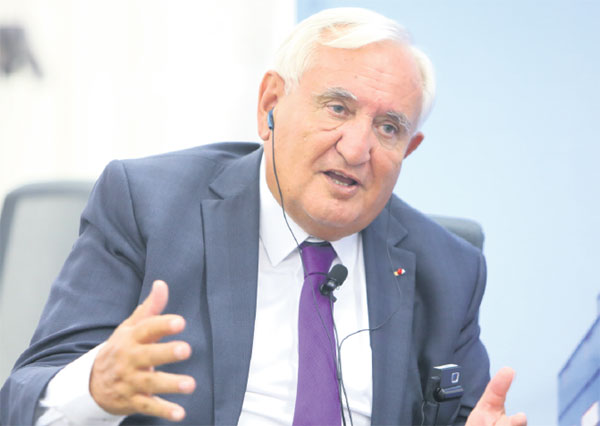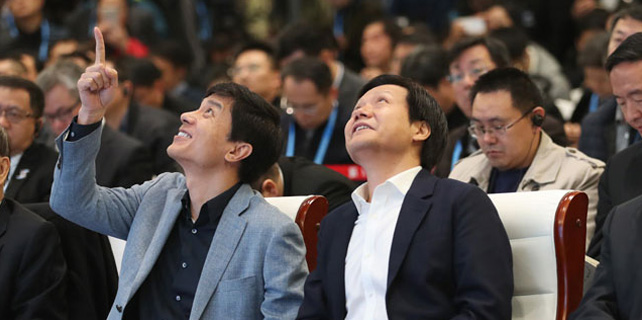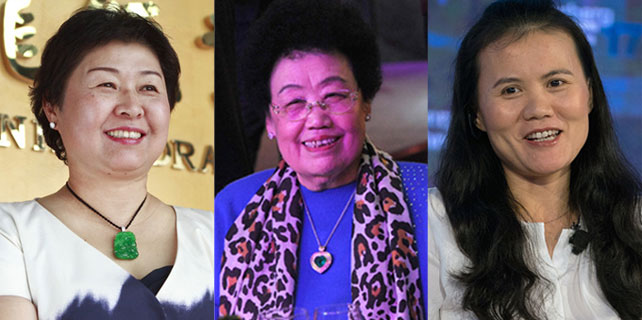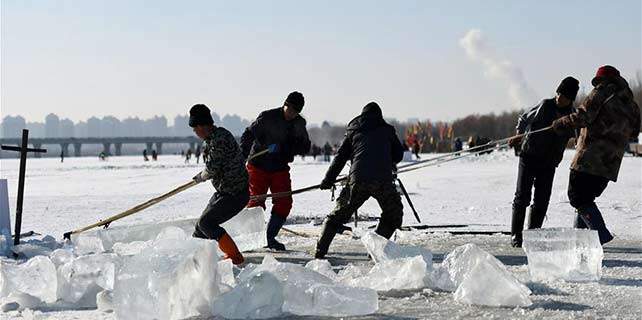Growing support for a shining idea
Former French leader says President Xi's notion of a community with a shared future is a panacea for the globe's problems
Former French prime minister Jean-Pierre Raffarin has offered his support for President Xi Jinping's idea that increasing cooperation between nations is the only way to solve the world's problems.
The 69-year-old, a regular visitor to China, believes Xi's concept of "a community with a shared future for mankind" offers hope for those who fear a return to 1930s-style protectionism.
|
Former French prime minister Jean-Pierre Raffarin says President Xi Jinping's concept of "a community with a shared future for mankind" is an idea for everyone. Provided by CEIBS |
"This primary objective laid out by Xi Jinping, which is a community for the future of humanity, is something that we all can share," Raffarin says.
"It is very closely linked to multilateralism. The fact that we have the commonality of a shared future means that we need to have multilateral governance."
Raffarin, speaking ahead of addressing an event at the China Europe International Business School in Shanghai, says the Belt and Road Initiative has in itself an important role in getting countries to work together.
"China is launching these cooperation-based initiatives because it is cooperation that is key to solving tensions on a global scale and also the path to creating a balance," he says.
"This balanced cooperation needs to be built in order to have better world governance."
Raffarin, who was prime minister from 2002 to 2005 when Jacques Chirac was president, sees US President Donald Trump's escalation of trade tensions as posing a major threat to global economic growth.
"We don't see this situation as just a spat between the United States and China, but rather as a unilateral position adopted by the Americans in order to change the terms of international trade. This not only puts at risk global growth, but that of the US, too," he says.
"I don't think anything positive will come out of the current tension. International trade will be the first victim."
Raffarin believes these current trade tensions make the China-EU Comprehensive Strategic Partnership, which this year marks its 15th anniversary, more important than ever.
"The transatlantic link between the US and Europe is not what it was, and perhaps President Trump is jeopardizing this historic Western priority," he says.
"Today we can see that priority is gradually shifting to the East. It might not be on an equal footing yet, but certainly some in Europe are saying we should look more to the East and that we don't look East enough."
Raffarin believes that China has so far shown a more constructive approach during the trade tensions, with Xi Jinping in his speech to the Boao Forum in Hainan in April demonstrating that China is prepared to be more open to foreign investment.
"We can see that with Xi's speech at the Boao Forum, and with China holding the first International Import Expo in November, that China wants to keep the door open and open it some more."
Raffarin believes the rest of the world needs to learn from the opening-up as demonstrated by the success of Deng Xiaoping's reform and opening-up, the 40th anniversary of which is being marked this year.
"A country like France needs reform and opening-up, and a great many other countries, too. The world is moving fast and we all need reform. What was initiated by Deng Xiaoping for China is now very important for the rest of the world," he says.
Raffarin believes there is already an understanding in the West of the significance of Deng's reform, even though some argue it is too often overshadowed by the end of apartheid in South Africa or the fall of the Soviet Union.
"I do think people in the West understand this event, even though they might not be fully aware of all the ins and outs. It is aware of the sheer power, intellectual, technological, and scientific, that has restored China to its original place as a world power."
Raffarin says France's relationship with China has always been very important politically at home.
Both Deng and former Chinese premier Zhou Enlai studied in France after WWI and France restored diplomatic relations with the country in 1964.
"It is a point for which there has been a total consensus among France's political leaders, and we see that now with Emmanuel Macron and his new generation coming up."
Raffarin sees cooperation in science and technology now being very important for France and China, with both countries having ambitions in artificial intelligence and other fields.
"Both France and China have invested a lot in innovation, and this is a both a priority for China and also for Macron."
The former prime minister says one area where France and China can work together is in Africa, where France still has a big colonial legacy.
"There is now tripartite cooperation between France, Africa and China, and we are working to strengthen this cooperation," he says.
Raffarin says France has maintained strong post-colonial commercial and political ties with Africa because of the way it views the world.
"We have many large companies installed in Africa in terms of communications and infrastructure. There are many bilateral ties between France and Africa, and there are many people with dual nationality who live in both places. So it brings us together," he says.
"France, if you like, has a more North-South relationship with the world, whereas the UK with the Commonwealth has a wider engagement.
Raffarin was appointed by former president Nicolas Sarkozy as his personal representative to promote the use of French internationally, Francophony, and he believes Africa is one of the keys to preserving this.
"The future of France and the French-speaking world is critical. We believe in France that French still has a future. French is a key part of the African continent and the use of French around the world."
He is concerned, however, about US President Donald Trump's seeming disrespect for French language and culture.
"President Trump appears to be as harsh on Canada as everywhere else in the world and, indeed, has criticized Canada's ambition to keep French as a language. Perhaps, however, that might unite our cause."
One of the debates about China is whether it is uniquely a civilization as well as a nation state. Some, such as former Hong Kong governor Chris Patten, have dismissed this, pointing to France as being a civilization state, too.
Raffarin, however, says the roots of French culture go beyond its own borders and so cannot be wholly ascribed to France.
"I am not here to contradict Chris Patten, someone who I have good relations with. I believe, however, we obviously have a cultural background that is partly European, chiefly Christian, and not just French as such," he says.
He says it is always interesting to contrast European ideas with those of Chinese ones, and he points to the work of French contemporary philosopher Francois Jullien, who is both a Greek specialist and a Sinologist.
"He is always looking for the differences between French thought - and when I say French thought, it also includes Greek and Latin - and that of the Chinese," he says.
Raffarin is a supporter of President Macron's vision for a more federalist Europe, even though a number of European Union countries remain skeptical, insisting that military tensions around Europe and problems of migration will drive this.
"General de Gaulle, who is still an inspiration for French politics, said that circumstances often trigger decisions. President Macron's proposal, which is to have a more united Europe with closer governance around the eurozone, will be reinforced by events going on around us."
He believes that with the UK scheduled to leave the European Union in March next year, there will be opportunities for Paris to take business away from the City of London's powerfully influential financial center.
"We already have a number of financial flows that are being redirected to Paris. We are currently discussing with Shanghai, for instance, (whether) to strengthen our position in relation to China."
Raffarin, however, is adamant that it is important not to penalize the UK for its decision to leave the EU.
"We do not want to punish the UK, and we must respect the decision of the British people. We acknowledge there are a number of areas, such as in defense and science and technology, where we need to continue to work together," he says.
As an example of that, the Frenchman adds, his country is cooperating with China in the Hinkley Point C nuclear power station in Somerset, England.
Raffarin believes it is important for European countries to work with China, particularly with initiatives like the Belt and Road.
He says the Belt and Road Initiative is an initiative to which France is fully subscribed.
"So as testimony to that, we have taken part in the AIIB (Beijing-headquartered Asian Infrastructure Investment Bank) and the Silk Road Fund, for which we have just signed our first agreement in Paris."
andrewmoody@chinadaily.com.cn
(China Daily European Weekly 07/27/2018 page32)























